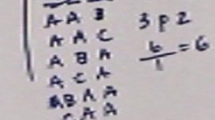Abstract
In this article we provide new evidence for mathematical problem-solving abilities of pre-school children. These problem-solving behaviours occurred in a study of sharing of discrete items by dealing, in which we examined the abilities of three categories of counters to solve a discrete re-distribution problem. We detail the problem solving strategies used in the context of sharing by dealing as a common action scheme of pre-school children in clinical interviews.
Similar content being viewed by others
References
Anastasi, A.: 1990, Psychological Testing (sixth edition), Macmillan Publishing Company, New York.
Clements, M. A. and Lean, G. A.: 1988, ‘Discrete' fraction concepts and cognitive structure”, Proceedings of the Twelfth Conference of the International Group for the Psychology of Mathematics Education, Vol. 1, pp. 215–222, Budapest, Hungary.
Davis, G. E.: 1990, ‘Reflections on dealing: An analysis of one child's interpretations’, in T. N. de Mendicutti (ed.), Proceedings of the Fourteenth Conference of the International Group for the Psychology of Mathematics Education, Vol. III, pp. 11–18, Oaxtepec, México.
Davis, G. E. and Hunting, R. P.: 1990, ‘Spontaneous partitioning: pre-schoolers and discrete items’, Educational Studies in Mathematics 21, 367–374.
Davis, G. E. and Pitkethly, A.: 1990, ‘Cognitive aspects of sharing’, Journal for Research in Mathematics Education 21(2), 145–153.
Hunting, R. P.: 1991, ‘The social origins of pre-fraction knowledge in three year olds’, in R. P. Hunting and G. E. Davis (eds.), Early Fraction Learning, pp. 55–72, Springer-Verlag, New York.
Hunting, R. P. and Sharpley, C. F.: 1988, ‘Preschoolers' cognitions of fractional units’, British Journal of Education Psychology 58, 172–183.
Kieren, T. E.: 1983, ‘Partitioning, equivalence, and the construction of rational number ideas’, in M. Zweng, T. Green, J. Kilpatrick, H. Pollack and M. Suydam (eds.), Proceedings of the Fourth International Congress on Mathematics Education, Birkhauser, Boston, pp. 506–508.
Miller, K.: 1984, ‘Child as the measurer of all things: Measurement procedures and the development of quantitative concepts’, in C. Sophian (ed.), Origins of Cognitive Skills, Erlbaum, Hillsdale, NJ.
Mulligan, J.: 1988, ‘An analysis of children's solutions to multiplication and division word problems—a pilot study’, Mathematics Education Research Group in Australasia, 11th Annual Conference, Deakin University, July 10–13, pp. 20–21.
Pepper, K. L.: 1990, ‘Preschoolers' knowledge of counting and sharing’. Conversations in Mathematics Education no. 3, The Institute of Mathematics Education, La Trobe University, Melbourne.
Steffe, L. P. and Cobb, P.: 1988, Construction of Arithmetical Meanings and Strategies, Springer-Verlag, New York.
Streefland, L.: 1987, How to Teach Fractions So As to Be Useful, OW & OC, The State University of Utrecht, Utrecht, The Netherlands.
Vergnaud, G.: 1983, ‘Multiplicative structures’ in R. Lesh and M. Landau (eds.), Acquisition of Mathematics Concepts and Processes, Academic Press, New York, pp. 127–174.
Author information
Authors and Affiliations
Rights and permissions
About this article
Cite this article
Davis, G., Pepper, K. Mathematical problem solving by pre-school children. Educ Stud Math 23, 397–415 (1992). https://doi.org/10.1007/BF00302442
Issue Date:
DOI: https://doi.org/10.1007/BF00302442




